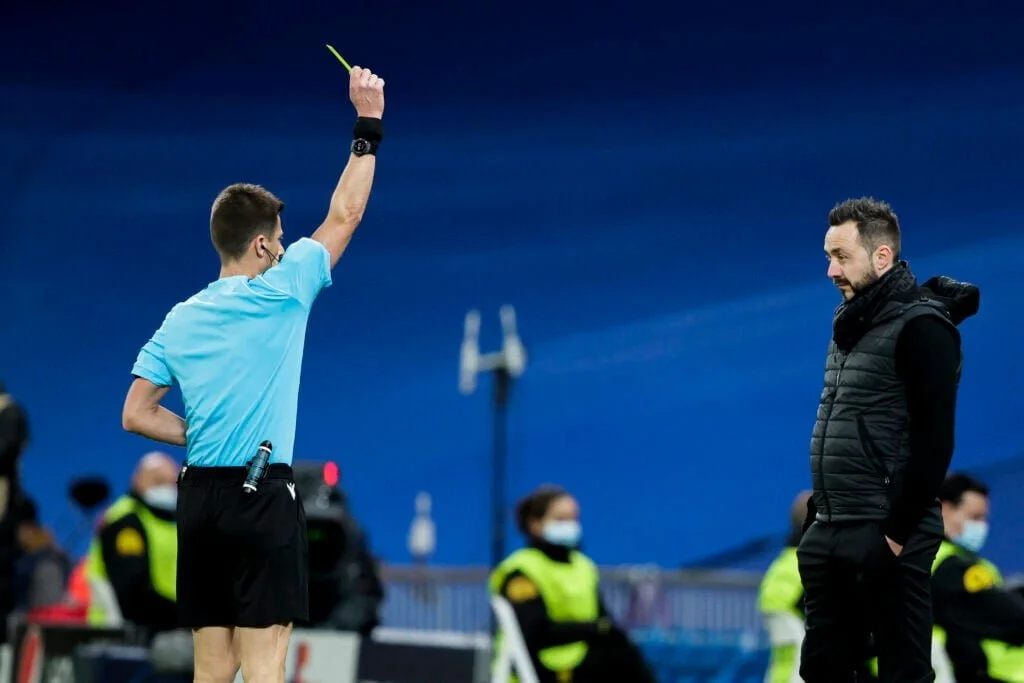The heart and the balls Серце і яйця
Looking back on Roberto De Zerbi’s tenure as Shakhtar Donetsk boss.
Tracking down someone to talk about Roberto De Zerbi’s time at Shakhtar Donetsk isn’t easy.
The first port of call would usually be supporter organisations or fan groups, but in the case of Shakhtar Donetsk, most of these people are currently fighting in a war.
This is an article about football, about Roberto De Zerbi’s approach to football, but also about the devastating nature of the invasion of Ukraine.
Kamil Rogolski is a journalist from neighbouring Poland, and has been a Shakhtar Donetsk fan since first watching them in 2006 when they played Legia Warsaw. He has been to Ukraine many times to see Shakhtar play and now raises money for humanitarian causes auctioning signed football shirts.
Kamil spoke with immense passion and sympathy for those involved in the conflict and how football is playing its part to raise spirits. It turns out that life and death may actually be more important than football.
From May 2021 to July 2022 Roberto De Zerbi coached a nomadic Shakhtar Donetsk - before the start of the ‘full war’ as Kamil put it - without ever setting foot in the city of Donetsk.
Shakhtar were uprooted from their state-of-the-art training facilities and stadium, the Donbass Arena (opened in 2009 and selected as a Euro 2012 semi-final venue), when the armed conflict commenced in 2014.
They have subsequently played home matches in Kharkiv, Kyiv and Lviv. If travel were possible it would be an 18-hour journey from Lviv to occupied Donetsk. The equivalent would be Brighton playing home games in Barcelona.
So how did De Zerbi end up in Ukraine? The person to thank for this is Darijo Srna, then Shakhtar’s Director of Football, who ended his playing career at Cagliari in Italy (after more than fourteen years as a Shakhtar icon) and had suffered on numerous occasions against De Zerbi’s Sassuolo team.
He was so impressed that when the opportunity arose, Srna recommended Roberto and his coaching team him to Shakhtar’s owner Rinat Akhmetov.
Akhmetov, it should be noted, is a controversial figure. He has been accused of being pro-Russian in the past. However he has made significant donations to the war effort and has publicly stated that he does not wish to be involved in politics, and regretted his previous involvements in political organisations and initiatives.
“De Zerbi, De Zerbi, and De Zerbi” remarked Akhmetov, when asked how many people were on the managerial shortlist at the time, “he’s the best coach in the world”.
But Roberto’s appointment wasn’t welcomed by everyone in Ukraine. There is scepticism in Ukraine about managers from overseas, and De Zerbi ended up disagreeing with some of his counterparts on the touchline, particularly ones who deployed a low block (also known as parking the bus!) to counter Roberto’s flowing football.
“He had a big argument with Rukh Lviv coach Leonid Kuchuk” explained Kamil, “who told him that he needed to change his job and that he wasn’t a professional coach! He was also sent off in that game.”
As we know, Roberto isn’t afraid to voice his opinions and nor is he shy at expressing his frustration at refereeing decisions and mistakes. At least he hasn’t told Sean Dyche to seek alternative employment yet... give it time.
It didn’t help that the Ukrainian press were quick to criticise when things didn’t go to plan. Kamil puts this down to the favouritism of Dynamo Kyiv, and that some people had traditionally seen Shakhtar as more Russian than Ukrainian. Though this is clearly not the feeling of the Chairman or the supporters.
Before De Zerbi’s Shakhtar beat Monaco in a Champions League qualifying tie (in August 2021), he had called for ‘heart and balls’ (a call-to-arms we have grown to love in Sussex), which the team certainly delivered on.
Monaco were comprehensively defeated – thanks to a De Zerbi masterclass - and a Champions League group stage spot was secured.
However, as soon as results went against him the headlines were ‘where are the balls and the heart when you need them?’. Ouch. Being a manager from overseas is a tough job in Ukraine and Roberto didn’t enjoy a great relationship with the media.
De Zerbi was brought in to change the style of play, but as with Brighton, his starting point was the system already in place at the club, and a clear focus on working with the players already at his disposal.
“He takes players and makes them world-class. This is what happened with Mudryk, who De Zerbi improved” said Kamil. For Mudryk read March, read Mitoma. De Zerbi had a superb record of identifying gems in the Donetsk squad, polishing them up, and doubling or tripling their value.
Tactically, De Zerbi favoured a back four, without using wingbacks, and a possession-based game played with both discipline and charisma.
How do fans feel about his time at the club? “This is hard to say” is Kamil’s considered answer to this question, “it is hard to find a community of fans easily because of the conflict. When he came in the supporters expected the team to win every week, but it did not always happen”. In the Champions League group stage (following the Monaco victory) they lost to a team they were widely expected to beat. FC Sheriff Tiraspol, from the Moldovan Super Liga, having been extremely profligate across the 90 minutes. 68% of possession and 21 attempts on goal led to a two nil defeat.
Roberto inherited a team that played attacking football, but Kamil wasn’t quite prepared for how things would change. “The way they played out from the back, like Barcelona, it was crazy, scary! We weren’t used to it, the goalkeeper and central defenders passing so dangerously. The central defender Mykola Matviyenko was so important for De Zerbi in this. He has a great left foot.”
Roberto left Ukraine when the war escalated and we’ve all heard the stories of how he showed great leadership by waiting for all of his players to be evacuated, before leaving himself.
‘I am staying in my room, today is not a good day’ De Zerbi said at the time. ‘I’ve been waiting for the federation to suspend the season. However until this happens I won’t move. I am here to do sport and I could not turn my back on the fans. There are thirteen Brazilian players here and my staff. We could have returned home, but we preferred to wait. Last night we woke up to the noise of explosions.’
But eventually he did depart, alongside the international players, leaving behind a team of home-grown Ukrainians. Think of us losing everyone, bar our English players.
Shakhtar are still competitive in the Ukrainian League (which carries on, albeit under extremely challenging conditions) but crashed out of last season’s Europa League, losing 8-2 on aggregate to Feyenoord. They were hammered 7-1 in the away leg. A far cry from their glory days of European football success (including a UEFA Cup victory in 2009) and squads packed with Brazilian internationals.
Season 23/24 has been a little kinder to them, featuring Champions League group stage football once again, albeit in extremely testing conditions, and the spectre of the ongoing war in Ukraine hanging over them.
Who knows where they could be now without the conflict and perhaps still with Roberto in the dugout, and a squad featuring both Ukrainian and overseas internationals?
Kamil would love to see De Zerbi back someday, and Roberto has hinted he’d like to one day finish the job he started.
He oversaw just 30 games in this period, but his stock grew. Thanks in part to the Champions League group stage qualifying performance, and beating Dynamo Kiev in the 2021 Ukrainian Super Cup final, most likely placing himself on Albion’s succession-planning radar, if he wasn’t known to the club already.
During his time at Shakhtar Roberto De Zerbi was able to play the way he wanted in the biggest club competition in Europe, whilst lifting the only domestic trophy available to him at that time.
Something telling for the future perhaps, as we continue our quest for success both domestically and on the European stage?
Mess was talking to Kamil Rogolski
This article was originally published in Dogma Issue 9, April 2023 and has been amended slightly for publication here.
Recommended further reading / listening
James Horncastle’s contribution to The Athletic’s Football Tactics podcast, recorded when De Zerbi first arrived at Brighton, who outlines Roberto’s beliefs and how these differ from the traditional football calcio approach favoured by most Italian football managers.
Listen at: https://theathletic.com/podcast/145-football-tactics-podcast/?episode=146
Dogma favourite Jamie Hamilton’s superb piece on Roberto De Zerbi’s philosophies (Dangerous Provocations), written in June 2021 (based on his time at Sassuolo and Shakthar Donetsk) but still relevant today.
Read at: https://medium.com/@stirlingj1982/dangerous-provocations-79acd3a890f
More Jamie Hamilton, but this time speaking on the Modern Soccer Coach podcast. This episode delves into the subject of positionism (as practiced by De Zerbi and others) vs relationism (as practiced by Fernando Diniz at Fluminense, and now the Brazil national team). One for the tactics hipsters.
Watch/listen at: https://www.youtube.com/watch?v=RZeDZEMxyAs
Ed Vulliamy’s article published in The Guardian (Frontline Football), for an update on the plight of Shahktar Donetsk and the difficulties experienced by football clubs operating in Ukraine (covering the period from Roberto’s departure to the present day).








